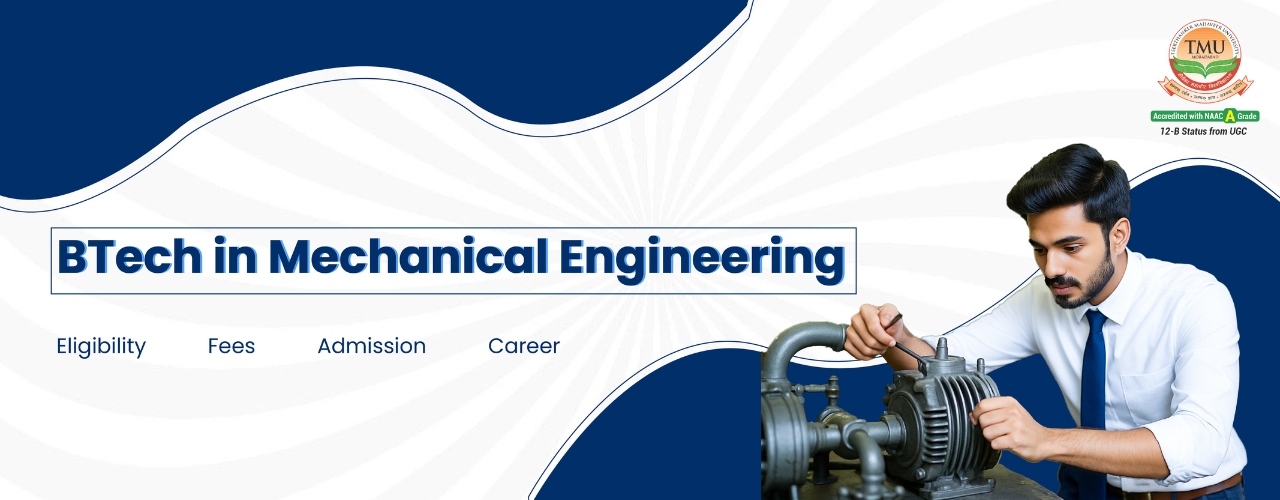BTech in Mechanical Engineering: Eligibility, Fees, Admission, and Career
Table of Contents
Mechanical Engineering plays a vital role in modern society by forming the backbone of industrial and technological development. It is vital for designing, developing, and maintaining machines and systems that drive industries, transportation, and energy production and manufacturing. Mechanical engineers assist in enhancing efficiency and safety, as well as sustainability, in machines such as automobiles, power plants, household appliances, and industrial machines.
What Is Mechanical Engineering?
Mechanical Engineering is an engineering branch that applies to designing, developing, manufacturing and maintaining machines and mechanical systems. It is about the study of motion and action on the basis of physics, mathematics, energy, and materials. Mechanical engineers deal with cars, equipment, engines, manufacturing equipment, cooling and heating, and industrial machinery. This engineering branch is one of the oldest and most versatile branches of engineering because it serves many industries, including automobile, manufacturing, power plants, robotics, aerospace, and construction.
Why Choose Mechanical Engineering?
- Versatility: You can work in various sectors—automotive, aerospace, power, energy, manufacturing, robotics, and more.
- High Demand: Mechanical engineers are always in demand due to their fundamental knowledge of physics and systems.
- Innovation-Centric: The field is ever-evolving with advancements in 3D printing, automation, and AI-driven machines.
- Global Opportunities: Mechanical engineering is universal—skills are transferable across borders.
Teerthanker Mahaveer University
Apply for Admission
Click Here To Apply for Admission
Course Overview – BTech in Mechanical Engineering
A BTech in Mechanical Engineering is a 4-year undergraduate program that combines theoretical and practical knowledge to build skills required in industries.
Course Duration and Structure
- Duration: 4 years (8 semesters)
- Format: Semester-based academic structure
- Includes: Lectures, practical labs, internships, projects, and industrial training
Core Subjects Covered
- Engineering Mechanics
- Thermodynamics
- Heat Transfer
- Fluid Mechanics
- Strength of Materials
- Machine Design
- Manufacturing Technology
- Robotics and Mechatronics
- CAD/CAM
- Automobile Engineering
Skills You’ll Gain
- Analytical thinking and problem-solving
- Technical design using software (AutoCAD, SolidWorks)
- Project management
- Real-world troubleshooting
- Strong fundamentals in Physics and Mathematics
BTech Mechanical Engineering Course Overview Table
| Aspect | Details |
| Course Name | Bachelor of Technology (BTech) in Mechanical Engineering |
| Course Duration | 4 Years (8 Semesters) |
| Eligibility | 10+2 with Physics, Chemistry, and Mathematics (PCM) |
| Admission Process | Entrance exam-based (e.g., JEE Main, JEE Advanced, state-level exams) |
| Average Course Fees | ₹2 – ₹10 Lakhs (varies by institution) |
| Top Entrance Exams | JEE Main, JEE Advanced, MHT CET, WBJEE, COMEDK, etc. |
| Core Subjects | Thermodynamics, Fluid Mechanics, Machine Design, Manufacturing, Robotics |
| Average Starting Salary | ₹3.5 – ₹6 LPA (varies by job and organization) |
| Top Recruiters | Tata Motors, L&T, BHEL, ISRO, DRDO, Mahindra, Maruti Suzuki, Infosys |
| Higher Studies Options | MTech, MBA, MS, Research, GATE/IELTS-based studies abroad |
| Job Profiles | Design Engineer, Maintenance Engineer, R&D Engineer, Production Engineer |
| Career Scope | Wide – across manufacturing, defence, energy, automotive, and aerospace sectors |
Eligibility Criteria for BTech Mechanical Engineering
Academic Requirements
To be eligible for a BTech in Mechanical Engineering, candidates must:
- Have passed 10+2 with PCM (Physics, Chemistry, Mathematics)
- Secure at least 50–60% marks in aggregate (varies by college)
- Some colleges may accept Biology or Computer Science as a fourth subject
Entrance Exams You Must Clear
Admission is mostly entrance-based. Key exams include:
- JEE Main and Advanced – for IITs, NITs, IIITs
- State-level exams like MHT CET, WBJEE, KCET, AP EAMCET
- Private University exams – VITEEE, SRMJEEE, BITSAT, etc.
Age and Other Criteria
- Must be at least 17 years old at the time of admission
- No upper age limit in most private universities, though JEE has limits
Admission Process for BTech in Mechanical Engineering
Step-by-Step Admission Guide
- Choose the Exam: Based on the college/university you’re targeting
- Fill out the Application: Register for exams and keep documents ready
- Take the Entrance Test: Prepare and appear in the respective exam
- Get Ranked: Based on performance, ranks or percentiles are issued
- Counselling Process: Fill in choices and lock preferred colleges/courses
- Seat Allotment: Get a seat based on rank, availability, and preferences
- Document Verification: Submit academic records, ID proof, and scorecards
- Pay Fees & Confirm Seat: Complete the admission by paying the initial fee
Counselling and Seat Allotment
- Centralised (e.g., JOSAA for IIT/NIT)
- State-wise (e.g., DTE Maharashtra for MHT CET)
- Institutional-level (e.g., VIT, BITS Pilani)
Top Entrance Exams for Mechanical Engineering
Getting into a reputable mechanical engineering program begins with clearing the right entrance exam. Here’s a list of the most popular and widely accepted exams in India for BTech Mechanical Engineering admissions.
JEE Main & Advanced
- JEE Main is the gateway for NITs, IIITs, and other centrally funded institutes.
- JEE Advanced is exclusively for admission to the Indian Institutes of Technology (IITs).
- These exams are highly competitive and test students on Physics, Chemistry, and Mathematics.
- Scoring well in JEE Advanced can secure you a spot in elite IITs like IIT Bombay, IIT Delhi, and IIT Madras.
State-Level and University Exams
- MHT CET (Maharashtra), WBJEE (West Bengal), KCET (Karnataka), AP EAMCET (Andhra Pradesh) are prominent state-level tests.
- VITEEE, SRMJEEE, BITSAT, and Amrita Entrance Exam are popular among private universities.
- These exams are slightly less rigorous than JEE Advanced but still require thorough preparation.
Each entrance exam has its own application cycle, pattern, and syllabus. Research well to apply to the ones that align with your college preferences.
BTech Mechanical Engineering Fees Structure
Understanding the fee structure helps in planning your finances and exploring scholarships if needed.
Government vs Private Colleges
| Type of College | Fee Range (4 Years) |
| IITs | ₹8–10 Lakhs |
| NITs | ₹6–8 Lakhs |
| State Govt. Colleges | ₹1.5–3 Lakhs |
| Private Colleges | ₹5–12 Lakhs |
Scholarships and Financial Aid
Many institutes offer scholarships based on:
- Merit (exam rank or academic score)
- Need-based (family income below threshold)
- Minority or Reserved Categories
- Special scholarships for girl students or underrepresented regions
Top scholarship options include:
- INSPIRE Scholarship
- Post-Matric Scholarships
- IIT/NIT internal merit-based grants
- Private scholarships (e.g., Tata, Aditya Birla)
Loans are also easily available from national banks for education in engineering.
Career Opportunities After BTech in Mechanical Engineering
Mechanical engineering opens up a plethora of job opportunities in India and abroad. The field is dynamic, and roles span multiple industries.
Job Profiles and Industries
Common roles include:
- Design Engineer – CAD modelling and system design
- Maintenance Engineer – Ensuring smooth operation of machinery
- Production Engineer – Overseeing manufacturing processes
- R&D Engineer – Developing and testing new technologies
- Thermal/Automobile Engineer – Specialising in HVAC or automotive systems
Major industries hiring mechanical engineers:
- Automotive
- Aerospace
- Oil and Gas
- Power and Energy
- Robotics and Automation
- Manufacturing and Heavy Machinery
- Defence and Space Agencies
Salary Trends
| Job Title | Average Salary (INR) |
| Design Engineer | ₹3.5–5 LPA |
| Production Engineer | ₹4–6 LPA |
| R&D Engineer | ₹5–7 LPA |
| Maintenance Engineer | ₹3–4.5 LPA |
| PSU/Defence Sector | ₹7–10 LPA |
Salaries improve significantly with experience, certifications, or higher studies.
Higher Education and Specialisations
A BTech doesn’t have to be the end of your academic journey—it’s just the beginning for many.
M.Tech., MS, MBA After B.Tech.
- MTech (India) – Via GATE, focus on specialised areas like Thermal, Design, or Robotics
- MS (Abroad)—via GRE + IELTS/TOEFL—allows deep specialisation and international exposure.
- MBA – Popular among engineers seeking leadership roles; top exams: CAT, GMAT, XAT
Trending Specializations
- Mechatronics
- Artificial Intelligence in Engineering
- Renewable Energy Systems
- Automotive Systems
- Robotics and Control Engineering
- Aerospace Systems
These fields are evolving rapidly, and expertise in them increases your value in the job market.
Government Jobs After Mechanical Engineering
Mechanical Engineering is one of the most sought-after branches when it comes to government jobs. With the right preparation and focus, students can land prestigious roles in various public sector units and government departments.
PSU Jobs via GATE
Public Sector Undertakings (PSUs) recruit a large number of mechanical engineers every year based on GATE (Graduate Aptitude Test in Engineering) scores. Top PSUs offering mechanical jobs include:
- BHEL (Bharat Heavy Electricals Limited)
- GAIL (Gas Authority of India Limited)
- NTPC (National Thermal Power Corporation)
- IOCL (Indian Oil Corporation Limited)
- HPCL, ONGC, DRDO, ISRO
These organisations offer high salaries (₹10–15 LPA), job stability, perks, and opportunities for career growth. To qualify, one must clear the GATE with a high rank and apply through the PSU’s recruitment portal.
Other Government Roles
Apart from PSUs, mechanical engineers can also apply for:
- Indian Engineering Services (IES) – Conducted by UPSC
- SSC JE (Junior Engineer)
- State Electricity Boards
- Railways (RRB JE/SSE posts)
- Defence (Army Corps of Engineers, DRDO, ISRO)
These jobs offer incredible job security, work-life balance, and the chance to serve the country in technical roles.
Scope of Mechanical Engineering in India & Abroad
The scope for mechanical engineers is broad and ever-expanding. Here's why:
- In India, sectors like automotive, defence, energy, and manufacturing continue to grow, creating demand for skilled mechanical professionals.
- The government’s push for Make in India, smart cities, and renewable energy projects further fuels opportunities.
- Globally, countries like Germany, Japan, Canada, and the USA have thriving mechanical sectors. Specialised roles in robotics, automation, and clean energy are rapidly growing.
- Engineers with global certifications or an MS from a foreign university often find lucrative roles in top MNCs abroad.
In essence, whether you choose to work in India or explore international options, the mechanical stream keeps the doors wide open.
Pros and Cons of a Career in Mechanical Engineering
Like every career, mechanical engineering has its highs and lows. Knowing them helps make informed choices.
Pros
- Wide Career Options: From aerospace to robotics
- Evergreen Field: Always in demand
- Global Recognition: Skills applicable worldwide
- Innovation-Driven: Encourages creativity and technical brilliance
- Strong Salary Packages (especially in government and MNCs)
Cons
- Initial Struggles: Entry-level salaries may be modest
- Field Jobs Can Be Demanding: Not always 9 to 5
- Higher Studies Often Required: For specialised roles or higher pay
- Intense Competition: Especially in top institutes and PSU jobs
Balancing expectations with reality is key to success in this profession.
Tips to Succeed in Mechanical Engineering
Want to stand out as a mechanical engineer? Here are some tried and tested tips:
- Master Core Subjects: Thermodynamics, Strength of Materials, Design
- Practice CAD/CAE Tools: SolidWorks, AutoCAD, ANSYS
- Intern Early & Often: Real-world exposure boosts confidence
- Build a Portfolio: Projects, designs, models—show what you can do
- Prepare for GATE from Day One: It opens up tons of career options
- Stay Updated: Follow industry trends—renewables, automation, AI
- Network Well: Join college clubs, attend seminars, and use LinkedIn wisely
- Go Beyond the Syllabus: Online courses (Coursera, NPTEL), certifications
Mechanical engineering rewards those who combine theoretical knowledge with practical application and proactive learning.
Why Choose TMU for BTech in Mechanical Engineering?
When it comes to pursuing a BTech in Mechanical Engineering, Teerthanker Mahaveer University (TMU) stands out as a top choice for aspiring engineers. Here's why TMU deserves your serious consideration:
1. Industry-Ready Curriculum
TMU offers a skill-centric curriculum that aligns with the latest trends in mechanical engineering. The program includes hands-on training in:
- CAD/CAM and 3D printing
- Robotics and automation
- Fluid dynamics and thermodynamics
- Mechatronics and AI-driven systems
The syllabus is updated regularly to incorporate new-age industry tools and software like SolidWorks, AutoCAD, and ANSYS, making graduates job-ready from day one.
2. State-of-the-Art Infrastructure
The School of Engineering at TMU features:
- Modern mechanical labs equipped with CNC machines, lathe simulators, and HVAC setups
- A dedicated Robotics Lab, Mechatronics Lab, and Material Testing Lab
- Access to a well-stocked digital library and e-resources for design and simulation tools
This hands-on learning environment boosts your practical skills and prepares you for real-world challenges.
3. Expert Faculty and Mentorship
TMU prides itself on its highly experienced faculty who are a blend of industry experts and academic scholars. Students receive:
- Personalized mentorship throughout the course
- Guidance on research, patents, and publishing papers
- Opportunities to work on industry-sponsored projects and live case studies
4. Strong Placement and Internship Support
TMU has a dedicated Corporate Resource Center (CRC) that works round the year to bring top recruiters to campus. Mechanical engineering students have secured placements in companies like:
- Tata Motors
- L&T
- Maruti Suzuki
- Hero MotoCorp
- Mahindra & Mahindra
Internships are offered through MOUs with industries, and students are encouraged to participate in industrial visits and training programs.
5. Career Development and Higher Study Assistance
TMU offers:
- GATE and GRE coaching support
- Help with foreign university admissions for MS
- Career guidance for PSU jobs and government exams
They also offer soft skills and personality development training to prepare you for interviews and the corporate world.
6. Affordable Fees with Scholarships
TMU makes quality education accessible through:
- Affordable fee structures
- Merit-based and need-based scholarships
- Special incentives for girl students, economically weaker sections, and state toppers
7. Vibrant Campus Life
TMU’s 130-acre campus in Moradabad, Uttar Pradesh, offers:
- Modern hostels, sports facilities, and cultural clubs
- Student chapters of SAE, ISHRAE, and ISTE
- Regular tech fests, hackathons, and competitions
It’s not just about studying—it’s about growing as a professional and as a person.
Conclusion
A BTech in Mechanical Engineering is not just a degree—it’s a foundation for a lifelong journey in innovation and technology. With opportunities across public and private sectors, in India and abroad, it’s a smart choice for students with a knack for problem-solving and a passion for machines. From design and manufacturing to automation and aerospace, mechanical engineers shape the modern world—and if you’re up for the challenge, this field is full of possibilities.
So, whether you’re gearing up for JEE, exploring college options, or mapping out a career plan, mechanical engineering offers one of the most diverse and rewarding paths in engineering.
FAQs
Q1. Is Mechanical Engineering good for BTech?
Ans: Yes, it is a good option as it offers wide career opportunities in core industries, government jobs, and higher studies.
Q2. Is BTech 3 years or 4 years?
Ans: BTech is a 4-year undergraduate course. It is 3 years only for lateral entry students after a diploma.
Q3. What is B.Tech in Mechanical Engineering?
Ans: It is an undergraduate engineering degree focused on machines, manufacturing, design, and mechanical systems.
Q4. Which type of BTech is best?
Ans: The best BTech branch depends on interest, but Mechanical, Computer Science, Electrical, and Civil Engineering are popular choices.
Q5. Can I do BTech without maths?
Ans: You can opt for MTech, MS abroad, MBA, or specialized certifications in areas like robotics, CAD/CAM, AI in manufacturing, etc.
This content gives an overview of the programme and is for educational purposes only. For updated admission guidelines and counselling support, please connect with our Counsellor Team.














